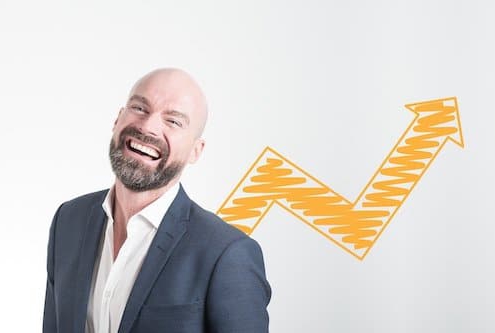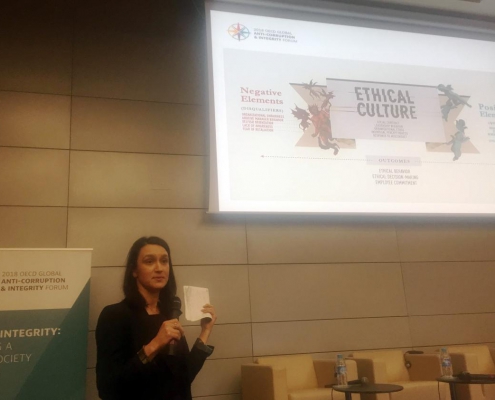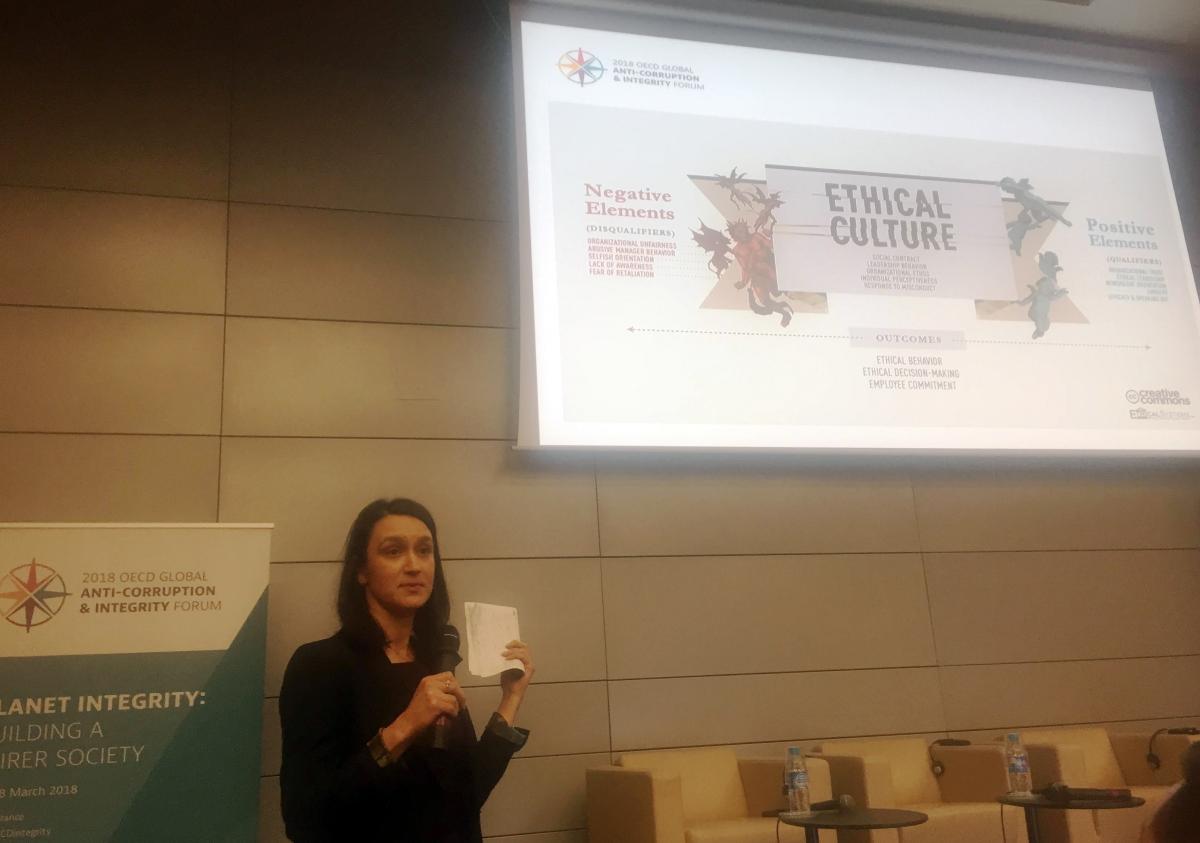Tag Archive for: Trust

The Difference Ethical Leadership Can Make in a Pandemic
Blog
It’s Time for a New Agenda for Business Integrity
Blog
The C.R.A.P. Framework for Addressing Workplace Bullshit
Blog
When Surveillance Is Self-Defeating
Blog
Here Is What Replaces Shareholder Primacy
Blog
Wall Street and the Behavioral Science of Making Culture Ethical
Blog
Azish Filabi Presents on Measuring Corporate Culture at the 2018 OECD Conference
Blog Last week, the Organisation for Economic Co-operation and Development (OECD) had its annual Anti-Corruption and Integrity Forum at their headquarters in Paris. Entitled Planet Integrity: Building a Fairer Society, over 2,000 attendees discussed how integrity plays a role in improving economic inequality, enhances the benefits of public policies and government programs, and more broadly equalizes the gains of globalization.
Last week, the Organisation for Economic Co-operation and Development (OECD) had its annual Anti-Corruption and Integrity Forum at their headquarters in Paris. Entitled Planet Integrity: Building a Fairer Society, over 2,000 attendees discussed how integrity plays a role in improving economic inequality, enhances the benefits of public policies and government programs, and more broadly equalizes the gains of globalization.
Ethical Systems won one of the OECD Research Edge competition awards. The paper, co-written by Caterina Bulgarella and myself, provided the summary of our culture assessment framework, which demystifies an often complex organizational issue: how to define and measure ethical culture.

The Echo Effect of the Bear Stearns Collapse: The Loss of Trust
Blog In the wake of the 10 year anniversary of the collapse of Bear Stearns, we’ve been considering the long-term impact of the financial crisis and its reverberations on Main Street today. For many, there’s been a seemingly permanent shift in how they view Wall Street, including its purpose and the people who have been charged with managing their hard earned money. While the economy may have recovered since the Great Recession, there are numerous former investors whose levels of trust in financial companies have not.
In the wake of the 10 year anniversary of the collapse of Bear Stearns, we’ve been considering the long-term impact of the financial crisis and its reverberations on Main Street today. For many, there’s been a seemingly permanent shift in how they view Wall Street, including its purpose and the people who have been charged with managing their hard earned money. While the economy may have recovered since the Great Recession, there are numerous former investors whose levels of trust in financial companies have not.
In a recent piece in The Wall Street Journal, writer Jason Zweig spotlights how the collapse of Bear Stearns wreaked havoc on the sense of fairness among everyday investors and “what psychologists call ‘belief in a just world,’ the notion that, on average, we get what we deserve.”

Building Cultures of Trust at Laureate Education
Blog Ethical Systems seeks to highlight companies with a strong commitment to ethical, speak up cultures and trust. One of these companies is Laureate Education, Inc., who created a series of internal videos for their 70,000 employees about trust, blame and ethics. We present them below with an introduction by Laureate's Chief Ethics & Compliance Officer, Mark Snyderman.
Ethical Systems seeks to highlight companies with a strong commitment to ethical, speak up cultures and trust. One of these companies is Laureate Education, Inc., who created a series of internal videos for their 70,000 employees about trust, blame and ethics. We present them below with an introduction by Laureate's Chief Ethics & Compliance Officer, Mark Snyderman.
Laureate Education, Inc. is the largest global network of degree-granting higher education institutions, with more than one million students enrolled across 70 institutions in 25 countries at campuses and online. Laureate offers high-quality, undergraduate, graduate and specialized degree programs in a wide range of academic disciplines that provide attractive employment prospects. Laureate believes that when our students succeed, countries prosper and societies benefit. This belief is expressed through the company's philosophy of being 'Here for Good' and is represented by its status as a Certified B Corporation™ and conversion in 2015 to a U.S. public benefit corporation, a new class of corporation committed to creating a positive impact on society.

Featured Ethics Scholar for October: Charles H.Green
Blog Interview with Charles H. Green, founder and CEO of Trusted Advisor Associates
Interview with Charles H. Green, founder and CEO of Trusted Advisor Associates
What are your main areas of research?
I’m not an academic, so I’ll have to define “research” a little loosely. But for the last 20 years, what I’ve focused on is the role played by trust in business relationships, particularly complex B2B relationships – and particularly in sales and in advisory relationships.
In practice, that has meant pointing out a distinction rarely used in business, even though it’s fairly obvious: the relationship between the trustor and the trustee. You can’t talk about trust in practical terms without distinguishing between those two very distinct roles (though most general discussions about ’trust’ do just that). The trustor initiates the relationship by taking a risk; the trustee responds, or not. And then the roles shift for the next go-round. Trust is iterative, dynamic, and creates itself around risk.
I have also focused on the role of personal relationships rather than institutional relationships, because trust is like politics – as Tip O’Neill said years ago, it’s all local. Or personal, in the case of trust. Institutional trust, like branding, is a far weaker force. The role of institutions in trust is largely to foster or hinder personal trust.
